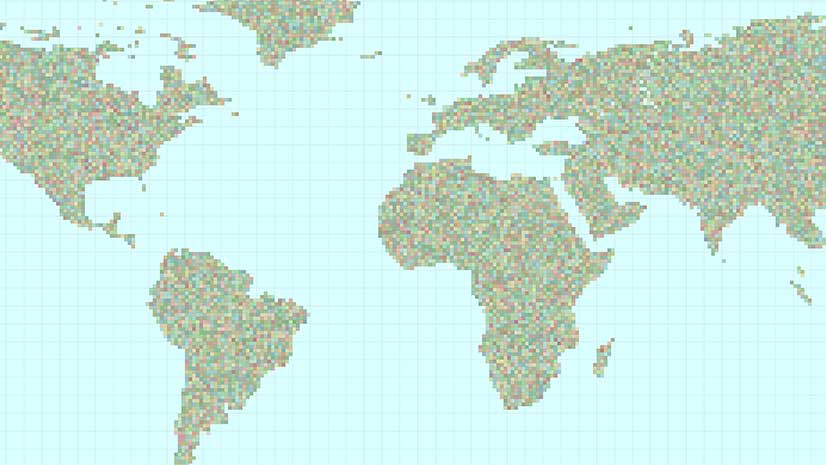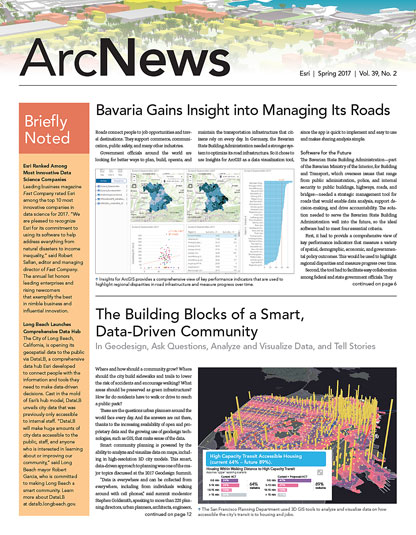
Throughout Cory Fleming’s career, her focus has been on community. Unsurprisingly, GIS has become central to her mission.
As a senior technical specialist and the director of the 311/CRM program at the International City/County Management Association (ICMA), Fleming advises government managers all over the world on data technologies and helps them implement centralized customer relationship management (CRM) systems, including 311 centers.
“311 centers tend to be hotbeds of innovation in local government,” said Fleming. “They have this wealth of data that can answer all sorts of questions.”
When a city has a 311 system in place, residents can dial those three numbers to report nonemergency problems.
“It’s a one-stop shop for citizens trying to connect with their local government,” said Fleming.
In turn, local governments aggregate and map the calls to explore where most of them come from and review the top reasons community members make these calls. With that, governments can work smarter—taking a closer look at how their services are functioning from neighborhood to neighborhood or figuring out how to best redevelop certain parts of town.
Although 311 systems have been around for more than 20 years, not all governments were implementing the technology in the early 2000s. Through a five-year study that Fleming led, the ICMA found out why: the systems were cost prohibitive and too complex to set up. But governments did want them—especially since nonemergency phone calls can bog down 911 circuits. So Fleming and the ICMA set out to provide local government managers with information about how to set up 311 systems and how to use the data from these systems to better run their cities.
“With a lot of these programs, whether you’re talking about a CRM system or an enterprise resource management system, all of them have GIS woven in,” said Fleming. “Everything you do at local government has a location attribute to it.”
She also provides simple and streamlined educational content—from books to blog posts—for the ICMA’s 11,000 members worldwide so they can better understand what’s happening in the realm of technology and make more informed technological purchases.
It is in this context that Fleming really became engaged in GIS—though she had crossed paths with it and mapping before.
At Iowa State University, Fleming started out studying civil engineering before switching to community and regional planning.
“I love the concept of being able to map out a community and make it better,” she said. “That’s what got me started on the community and regional planning.”
After a post-college stint working in community development for the State of Iowa, Fleming moved to Washington, DC, where she became a program manager for the International START Secretariat, a scientific capacity building program that sets up regional groups of scientists to work on environmental change research in their communities. The idea is that these local experts can inform their governments about sustainable environmental practices instead of having the information come from foreign scientists.
“In that position, I was able to see how useful GIS was from a policy perspective,” she said.
One START project that left a lasting impression on Fleming was working with a US-based scientist who was helping peers in Africa map out a new road. They wanted to maintain the local forest, but the road had to meet certain criteria. The team came up with three different options that satisfied all the criteria and then scrutinized the roads to see which one would be the least disruptive. They then made their recommendations to the local government.
“That was incredibly powerful to me to watch the reactions to that kind of information,” recalled Fleming. “You can really help people understand quickly and clearly when you have a map.”
While working full-time at START—where she broadened her scope of what it means to be part of a community—Fleming also earned a master’s degree in environmental studies from Johns Hopkins University.
“The whole issue of sustainability and how we make the planet a better place drew me to environmental science,” she said. “Science is how you defend policy decisions. The better your science, the better your ability is to produce meaningful results through policy.”
In other words, Fleming was interested in data-driven decision-making—the foundation of GIS.
After completing graduate school, Fleming worked at the Urban Institute, a social and economic policy research center, before making the jump to the ICMA. Her first big project there was editing The GIS Guide for Local Government Officials, published by Esri Press in 2005. That was her real foray into GIS.
“Now, my primary responsibility is making sure that our members understand GIS and what it can do for them and their local governments,” explained Fleming.
She said it has been fascinating to learn how local governments are using GIS to improve efficiency. In Minneapolis, Minnesota, for example, setting up a 311/CRM system helped the city respond more quickly to citizen requests. It had code enforcers assigned to four quadrants throughout the city. But one quadrant was always behind in answering service calls, and nobody understood why. When city staff started looking at the data using GIS, they realized that that quadrant was receiving 33 percent of the service requests while another one was only getting 16 percent. So the city moved the boundaries, and suddenly all quadrants were up to speed.
“They were able to distribute resources on a more equitable basis,” said Fleming.
Making cities and towns better places for people to live is important to Fleming, and she sees GIS as a way to do that.
“She has insight into what cities and counties care about and then has a great understanding of how to take technology and turn it into something they really care about, whether that’s cross-jurisdictional collaboration or public safety,” said Esri’s national government marketing specialist Noel Loughrin, who works with Fleming often.
Fleming, who now lives outside Portland, Maine, is at the helm of making communities better and smarter.
“The thing about Maine that I love is there are all these little gems of places you can go hiking, biking, and kayaking, and I want to preserve those for the next generation,” she said. “I think GIS can help do that.”

